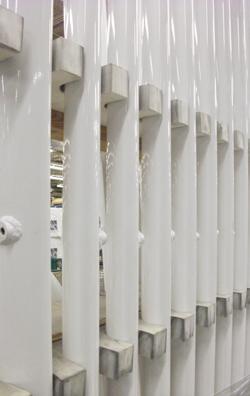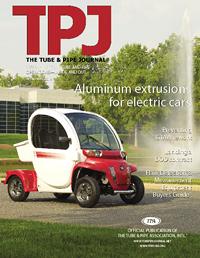- FMA
- The Fabricator
- FABTECH
- Canadian Metalworking
Categories
- Additive Manufacturing
- Aluminum Welding
- Arc Welding
- Assembly and Joining
- Automation and Robotics
- Bending and Forming
- Consumables
- Cutting and Weld Prep
- Electric Vehicles
- En Español
- Finishing
- Hydroforming
- Laser Cutting
- Laser Welding
- Machining
- Manufacturing Software
- Materials Handling
- Metals/Materials
- Oxyfuel Cutting
- Plasma Cutting
- Power Tools
- Punching and Other Holemaking
- Roll Forming
- Safety
- Sawing
- Shearing
- Shop Management
- Testing and Measuring
- Tube and Pipe Fabrication
- Tube and Pipe Production
- Waterjet Cutting
Industry Directory
Webcasts
Podcasts
FAB 40
Advertise
Subscribe
Account Login
Search
Yearning for learning
Window manufacturer learns to extrude, bend, finish aluminum
- By Eric Lundin
- April 26, 2011
- Article
- Tube and Pipe Fabrication
When James Castoro founded Custom Aluminum Products in 1960, the company’s premise was simple and concise: It produced aluminum products, mainly storm windows and storm doors. It was a good time to be in the business—the baby boom was in full swing, and the U.S. population was growing an average of 1.8 percent per year. More than 1 million new homes and apartments would be built the following year, and the number would grow to more than 2 million per year by the end of the decade. The need for storm doors and storm windows was solid and growing.
Castoro probably could have made a good living in this niche. However, he isn’t one for niches. He already had a wealth of manufacturing knowledge, having worked at the Elgin Watch Factory and Kawneer, later known as Aluminum Corp. of America (ALCOA). He had previously founded another company, JC Metal Products, and developed an aluminum threshold with a vinyl attachment that made a weathertight seal for exterior doors.
In other words, when Castoro founded Custom Aluminum, he was just getting started.
Expansion in Elgin
The first building was a modest 2,500-sq.-ft. structure in Elgin, Ill., a Chicago suburb. The business grew fast, and in 1961 Castoro moved to a bigger facility. Most of the 5,000-sq.-ft. building was dedicated to manufacturing; the front was set up for retail sales. Before long Castoro added plastic injection molding to the company’s manufacturing repertoire, enabling it to make ancillary components such as latches, corner keys, and handles. Castoro also branched out to offer related services, such as screen repair and screen replacement.
In addition to selling products directly to homeowners in the storefront, Castoro also sold doors and windows to local lumberyards, one pickup load at a time. It was a humble beginning and the staff was small—Castoro was involved in manufacturing, sales, and delivery.
Adding plastic injection molding and screen repair services were good moves, but small potatoes compared to what came next. Dissatisfied with lead-times and quality from some of his suppliers, Castoro developed a plan, an ambitious and audacious plan, for getting some control over the extrusions fabricated at his shop. Relying on the knowledge and experience he picked up working at ALCOA, Castoro figured he and his staff could learn to extrude their own products, so he purchased the company’s first extrusion press. Capable of extruding billet up to 3 ½ in. in diameter, the press was used to make components for a snowmobile manufacturer, Kiekhaefer-Mercury.
Each day the fabricator sent a truckload of snowmobile frames on the 150-mile journey to the Kiekhaefer-Mercury plant in Fond du Lac, Wis. Custom Aluminum inspected the parts before trucking them northward, so Kiekhaefer-Mercury could start manufacturing the sleds immediately after receiving the delivery. In other words, Castoro was far ahead of his time, providing just-in-time deliveries in 1968.
In 1970 the company added a second press, one capable of extruding billet up to 5 1/8 in. dia. Around the same time, Castoro was having difficulty acquiring prime billet, so the company had to rely on secondary billet. Castoro bet his staff could learn to smelt aluminum, so he purchased an aluminum smelter, which allowed him to turn scrap into billet on-site.
Castoro wasn’t done with vertical integration. In 1972 he expanded downstream when he added an anodizing line. Ever the entrepreneur, he used the company’s new capability in three ways: anodizing products, pretreating products for painting, and providing anodizing services to other manufacturers. In 1973 the company augmented its finishing capability with a painting line. While many companies would eliminate volatile organic compounds years later, Castoro prevented that headache by opting for water-soluble paints from the start.
In 1976 Castoro added a third press that could extrude billet up to 7 in. dia., and in 1986 purchased a press capable of handling billet up to 10 in. dia.
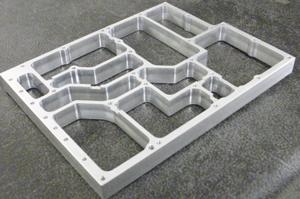
Precision machining enabled the company to enter new markets, including military, medical, aerospace, electronics, and agricultural.
Castoro was keen to continue acquiring capabilities, so the company added machining to its repertoire.
“Mr. Castoro doesn’t want to be limited by lack of capabilities,” said Shane Tredup, vice president of operations. A recent bender purchase illustrates Castoro’s perspective.
“We made a case for purchasing a bender, and he agreed that we should do it,” Tredup said. No muss, no fuss, no layers of bureaucracy, no endless meetings, no overwrought cost justification. It’s streamlined and fast—make a solid case and get an answer.
“It’s one of the advantages of a privately held company,” Tredup said.
Based on the number of presses it uses, it would be understandable to think that Custom Aluminum Products is an extruder, but it hasn’t drifted far from its origins as a fabricator.
“More than 50 percent of our output, measured by weight, is fabricated,” said Steve Dillett, company president.
Value-added services include bending, punching, drilling, miter cutting, welding, painting, powder coating, and anodizing. It also provides engineering assistance.
Adding capabilities and penetrating new markets do more than create new revenue streams. It brings in work that runs more steadily than the window and door business, which is seasonal. To that end, Castoro also took a vendor-managed-inventory approach to the window and door business. Adding windows and doors to inventory during the winter, and using that inventory during the busy months, helps to smooth the production cycle and reduces lead-times.
A Learning Organization
Castoro didn’t go it alone. Far from it. From the beginning his brothers Salvatore and Joe and a cousin, Jeff, were part of the business. Likewise, nephews Tony and Vincent joined the business, as did his son, John, the current CEO.
At the same time Castoro hasn’t relied solely on his own knowledge and expertise. His vision for Custom Aluminum Products is to be a growing, learning organization. While on-the-job training has long been part of the company’s culture, it puts quite a bit of stock in classroom instruction too.
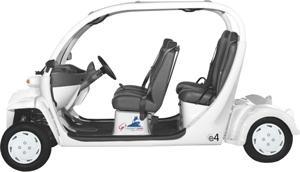
All-electric vehicles are still rare but they are gaining ground. Custom Aluminum extrudes, bends, and finishes the roof rail for this electric car. Designated a neighborhood electric vehicle (NEV), it is street-legal in the U.S. on roads with speed limits up to 45 miles per hour. Many universities and theme parks use this sort of car as a hospitality vehicle.
“This building has a 300-seat auditorium,” said Dillett. “We have a program called Custom University. We hold classes every month for our employees. Some of the classes are specific to industry, but we have regular college courses too,” he said.
“In the past year we have taught classes on Six Sigma, 5S, and geometric dimensioning and tolerancing—we had that twice—and courses on pretreatment, painting, and welding,” Tredup said. Some of the courses are taught by the company’s suppliers.
“We partner with our vendors on some courses to learn about a specific product—for example, a new paint,” Dillett said. “We want to avoid being insulated. Custom University allows us to keep fresh on new technologies,” he said.
The company seeks new products to put its knowledge to use.
“Diversity in our product lineup is very important to us,” Dillett agreed.
These opportunities reinforce and augment the classroom learning, creating a virtuous cycle of learning and doing and learning some more.
This has become part of the company’s culture. According to Tredup, the punch-in-do-my-job-punch-out mentality doesn’t have a place at Custom Aluminum Products.
“Everyone’s here for more than a paycheck,” he said. “New products are opportunities to do different things.”
Going Green
A recent project illustrated how the company has prepared itself for new challenges.
High gasoline prices and the drive to reduce carbon emissions have fueled a growing interest in hybrid and electric vehicles, and the shop found itself in the right place at the right time with the right expertise. Reducing an automobile’s weight means, in many cases, switching from steel to aluminum. Custom Aluminum’s latest venture is extruding and roll bending an aluminum roof rail for an electric vehicle manufactured by Chrysler.
Getting the contract for the roof rail wasn’t a simple task. The rail was an existing part, so the company had to win the business from a competitor. According to Tredup, the part had numerous problems.
“It had dimensional inconsistency and severe cosmetic issues,” Tredup said. “It was subjected to a lot of handling, and it had to be powder-coated a high-gloss white,” he said. Furthermore, it was a multiradius bend, and the bulk of Custom Aluminum’s experience was in single-radius bending. It was starting to sound like a worst-case scenario.
However, the shop had a critical advantage: It did have considerable roll bending expertise. For years it had been making large arched windows for Andersen® Corp., the upscale window and door manufacturer. These are the sorts of windows put in homes priced $250,000 and up. Architecture of this caliber doesn’t leave much latitude for variations of any sort, whether dimensional or cosmetic.
“Stretch-bending aluminum can result in an orange-peel effect,” Tredup said. Paint doesn’t cover this sort of flaw; in fact, a high-gloss finish seems to amplify it. Custom Aluminum chose to roll bend it, but this isn’t without difficulties either.
“Roll bending induces scratching,” Tredup said.
The company had a second critical advantage: a learning perspective. “One question we asked ourselves was, ‘How hard can it possibly be?’” Tredup said.
Eventually the company overcame the many challenges in making this part successfully. The company doesn’t disclose much about the process, but acknowledges that it uses a roll bender and an unusual technique to prevent deformation. After bending the part, the equipment operator places the part into a check fixture to verify that its shape is dimensionally accurate. He then cuts both ends to the right length and checks it in a second fixture to ensure that the finished length is correct.
The roof rail captures the essence of the company. The part wasn’t easy—Custom Aluminum had to use its accumulated knowledge of extruding and bending aluminum to overcome a couple of manufacturing hurdles. That said, the company’s expertise goes beyond extruding aluminum, fabricating, and machining—it does all that and it makes products that look good. Approximately 75 percent of the parts it manufactures go into high-visibility items, such as lighting systems for residential and retail applications, display cases for bakeries, signage and décor for restaurants, equipment carts for medical facilities, and myriad other applications that require a first-rate cosmetic appearance.
This isn’t learned overnight. It’s the result of 50 years in the industry.
What’s Next?
The aluminum extrusion industry is anything but static.
“Many of the parts we make last just a few years,” Tredup said. “In some cases, less than two. The OEM might switch to plastic extrusion, make a change in the part’s design, or retire it,” he said.
The demand for aluminum has fallen in the last 10 years. The U.S. consumed 7 million metric tons of it in 1999, which fell to 3.25 million metric tons by 2009, according to the U.S Geological Survey. Still, there’s no doubt that Custom Aluminum Products is bucking that trend.
“When I joined the company 16 years ago, we had 200,000 sq. ft.,” Tredup said. “Today we have just under 1,000,000,” he said, referring to its four locations (South Elgin, Ill., Genoa, Ill., St. Louis, Mo., and Atlanta, Ga.).
New parts, part changes, and expanding the company’s manufacturing capabilities to keep up with industry changes aren’t problems to be overcome but opportunities to be embraced. The staff would acknowledge that they don’t know it all, but likewise this isn’t a problem either. The staff at Custom Aluminum Products is always willing to learn.
Fit, Form, and Function
While Steve Dillett, Custom Aluminum Products’ president, is happy to talk about the company’s bread-and-butter high-volume products, his eyes light up when he mentions the challenges and satisfaction he gets from the company’s one-off projects. Among his favorites is a recent trend: decorative, artistic projects, often made for the lobby of a commercial building. Usually the client is a straight-laced institution such as a bank or a hospital and wants something eye-catching.
For projects like that, Custom Aluminum has to pull together nearly all of its collective expertise. It’s up to the engineers to determine how to divide up the shape, cut and bend each part, and so on. The design team has to see every part from the perspective of every employee involved in cutting, bending, powder coating, material handling, and packaging. It also has to be aware of the sizes, shapes, and weights of the packages so they’re manageable for shipping. Most important, it has to see it from the assembler’s perspective. Custom Aluminum has to deliver a complete kit—parts, corner keys (joins or splices), and assembly instructions.
The parts have to go together easily enough, and the assembly instructions have to be thorough enough, that the contractor in charge of the assembly can put it together quickly, despite having little familiarity with the project.
Only by seeing the project through the eyes of its manufacturing staff, the shipper, and the installer can Custom Aluminum deliver a successful project.
About the Author

Eric Lundin
2135 Point Blvd
Elgin, IL 60123
815-227-8262
Eric Lundin worked on The Tube & Pipe Journal from 2000 to 2022.
About the Publication
subscribe now
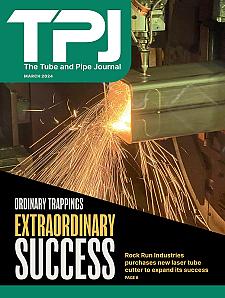
The Tube and Pipe Journal became the first magazine dedicated to serving the metal tube and pipe industry in 1990. Today, it remains the only North American publication devoted to this industry, and it has become the most trusted source of information for tube and pipe professionals.
start your free subscription- Stay connected from anywhere

Easily access valuable industry resources now with full access to the digital edition of The Fabricator.

Easily access valuable industry resources now with full access to the digital edition of The Welder.

Easily access valuable industry resources now with full access to the digital edition of The Tube and Pipe Journal.
- Podcasting
- Podcast:
- The Fabricator Podcast
- Published:
- 04/16/2024
- Running Time:
- 63:29
In this episode of The Fabricator Podcast, Caleb Chamberlain, co-founder and CEO of OSH Cut, discusses his company’s...
- Trending Articles
Team Industries names director of advanced technology and manufacturing

3D laser tube cutting system available in 3, 4, or 5 kW
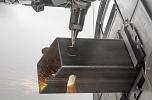
Corrosion-inhibiting coating can be peeled off after use
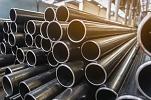
Zekelman Industries to invest $120 million in Arkansas expansion
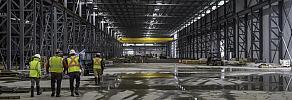
Brushless copper tubing cutter adjusts to ODs up to 2-1/8 in.
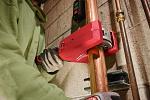
- Industry Events
16th Annual Safety Conference
- April 30 - May 1, 2024
- Elgin,
Pipe and Tube Conference
- May 21 - 22, 2024
- Omaha, NE
World-Class Roll Forming Workshop
- June 5 - 6, 2024
- Louisville, KY
Advanced Laser Application Workshop
- June 25 - 27, 2024
- Novi, MI
























